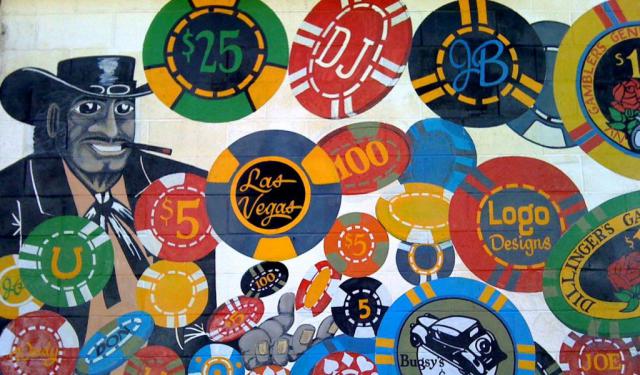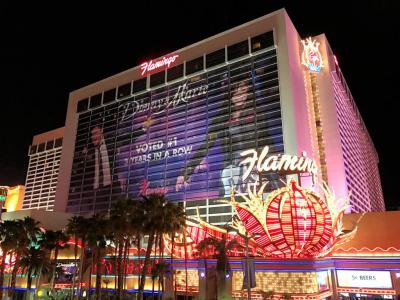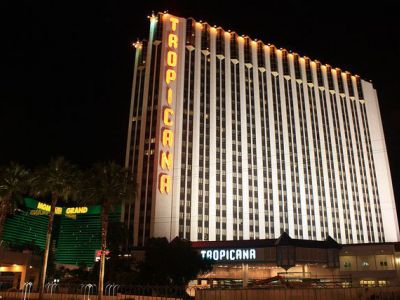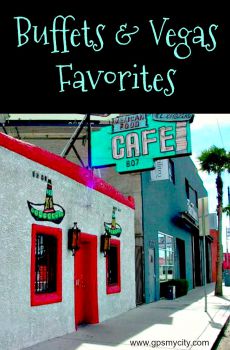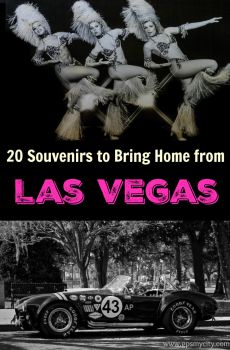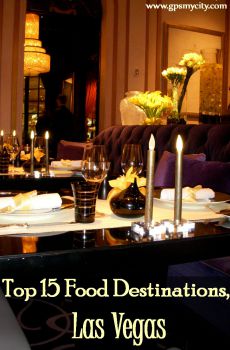Gangster Attractions Walking Tour (Self Guided), Las Vegas
The development of Las Vegas as a gambling and entertainment hub in the mid-20th century drew the attention of powerful criminal syndicates, who saw the potential for profit in the city's casinos and other enterprises. Indeed, Las Vegas with its glitz and glamour wouldn't be what it is now without the involvement of mobster “wiseguys”. There are still a few places in town that evoke the mob-tinged Vegas heyday and inspired a bunch of Hollywood movies.
One of the most notorious figures in Las Vegas's gangster history was Benjamin "Bugsy" Siegel, a Jewish American mobster who played a key role in developing the Flamingo Hotel and Casino on the Strip in the late 1940s. Another location with a storied past, intertwined with gangsters, is the El Cortez Hotel and Casino, once owned by Siegel and also frequented by other “celebrity” criminals, such as Tony "The Ant" Spilotro, a prototype of the character portrayed by Joe Pesci in the "Casino" movie.
The nearby Mob Museum chronicles the city's history of organized crime and its ties to the national underworld. Tony Roma's, a popular steakhouse chain, has a special place in the Las Vegas gangster scene, too, much as the Tropicana Las Vegas Hotel, located on the Strip. This hotel-casino opened in 1957 and was owned by a consortium of mobsters, including Frank Costello; today it continues to offer visitors a taste of vintage Las Vegas glamour.
The "Sin City" nickname for Las Vegas originated during the gangster era and referred to the city's reputation as a place of vice, corruption, and illicit activities. If you're keen to see some of the most famous mob spots in Vegas that haven't yet been rubbed out by redevelopment over the years, take this self-guided walk.
One of the most notorious figures in Las Vegas's gangster history was Benjamin "Bugsy" Siegel, a Jewish American mobster who played a key role in developing the Flamingo Hotel and Casino on the Strip in the late 1940s. Another location with a storied past, intertwined with gangsters, is the El Cortez Hotel and Casino, once owned by Siegel and also frequented by other “celebrity” criminals, such as Tony "The Ant" Spilotro, a prototype of the character portrayed by Joe Pesci in the "Casino" movie.
The nearby Mob Museum chronicles the city's history of organized crime and its ties to the national underworld. Tony Roma's, a popular steakhouse chain, has a special place in the Las Vegas gangster scene, too, much as the Tropicana Las Vegas Hotel, located on the Strip. This hotel-casino opened in 1957 and was owned by a consortium of mobsters, including Frank Costello; today it continues to offer visitors a taste of vintage Las Vegas glamour.
The "Sin City" nickname for Las Vegas originated during the gangster era and referred to the city's reputation as a place of vice, corruption, and illicit activities. If you're keen to see some of the most famous mob spots in Vegas that haven't yet been rubbed out by redevelopment over the years, take this self-guided walk.
How it works: Download the app "GPSmyCity: Walks in 1K+ Cities" from Apple App Store or Google Play Store to your mobile phone or tablet. The app turns your mobile device into a personal tour guide and its built-in GPS navigation functions guide you from one tour stop to next. The app works offline, so no data plan is needed when traveling abroad.
Gangster Attractions Walking Tour Map
Guide Name: Gangster Attractions Walking Tour
Guide Location: USA » Las Vegas (See other walking tours in Las Vegas)
Guide Type: Self-guided Walking Tour (Sightseeing)
# of Attractions: 5
Tour Duration: 4 Hour(s)
Travel Distance: 10.2 Km or 6.3 Miles
Author: alice
Sight(s) Featured in This Guide:
Guide Location: USA » Las Vegas (See other walking tours in Las Vegas)
Guide Type: Self-guided Walking Tour (Sightseeing)
# of Attractions: 5
Tour Duration: 4 Hour(s)
Travel Distance: 10.2 Km or 6.3 Miles
Author: alice
Sight(s) Featured in This Guide:
- Mob Museum
- El Cortez Hotel and Casino
- Tony Roma’s
- Flamingo Las Vegas
- Tropicana Las Vegas Hotel
1) Mob Museum (must see)
The National Museum of Organized Crime and Law Enforcement, popularly known as the Mob Museum, is a dedicated institution that showcases the artifacts, narratives, and historical significance of organized crime in the United States. It also highlights the efforts and strategies employed by law enforcement to combat such criminal activities. Opened on February 14, 2012, the museum is housed in the former Las Vegas Post Office and Courthouse, a building constructed in 1933 and listed on the National Register of Historic Places.
The choice of location is significant. The building once served as a functioning federal courthouse and hosted high-profile hearings, including sessions of the Kefauver Committee, which investigated organized crime across the United States. The restored courtroom on the upper floor preserves this history and places visitors in the same space where testimony helped expose the national reach of criminal syndicates. Elsewhere in the museum, original artifacts such as wiretapping equipment, surveillance tools, and pieces of physical evidence illustrate both criminal operations and investigative techniques.
In April 2018, the Mob Museum unveiled a notable addition known as the Underground Exhibit. Located in the basement, this fully operational speakeasy and distillery pays homage to the Prohibition era through its Art Deco design and an array of authentic artifacts from the 1920s. It commemorates the bootleggers, rumrunners, and moonshiners who supplied Americans with alcohol during the thirteen-year federal Prohibition period.
Among the Underground’s standout features is a specially crafted still used to produce in-house 100-proof, 100% corn moonshine, recognized for both its authenticity and safety. Originally available only on-site, the Mob Museum’s moonshine became available for purchase in 2019 through select Lee’s Discount Liquor stores across the Las Vegas Valley. The basement setting provides a fitting atmosphere for a speakeasy-style experience. Once inside, guests can enjoy classic cocktails and moonshine while taking in the ambiance of live jazz music.
The choice of location is significant. The building once served as a functioning federal courthouse and hosted high-profile hearings, including sessions of the Kefauver Committee, which investigated organized crime across the United States. The restored courtroom on the upper floor preserves this history and places visitors in the same space where testimony helped expose the national reach of criminal syndicates. Elsewhere in the museum, original artifacts such as wiretapping equipment, surveillance tools, and pieces of physical evidence illustrate both criminal operations and investigative techniques.
In April 2018, the Mob Museum unveiled a notable addition known as the Underground Exhibit. Located in the basement, this fully operational speakeasy and distillery pays homage to the Prohibition era through its Art Deco design and an array of authentic artifacts from the 1920s. It commemorates the bootleggers, rumrunners, and moonshiners who supplied Americans with alcohol during the thirteen-year federal Prohibition period.
Among the Underground’s standout features is a specially crafted still used to produce in-house 100-proof, 100% corn moonshine, recognized for both its authenticity and safety. Originally available only on-site, the Mob Museum’s moonshine became available for purchase in 2019 through select Lee’s Discount Liquor stores across the Las Vegas Valley. The basement setting provides a fitting atmosphere for a speakeasy-style experience. Once inside, guests can enjoy classic cocktails and moonshine while taking in the ambiance of live jazz music.
2) El Cortez Hotel and Casino
El Cortez is a casino-hotel property in continuous operation since November 7, 1941, making it one of the city’s oldest still-active casino resorts. Despite being initially considered slightly removed from the core of downtown activity, the property achieved early success, attracting the attention of prominent organized crime figures. In 1945, it was acquired for $600,000 by Bugsy Siegel, Meyer Lansky, Gus Greenbaum, and Moe Sedway. For Siegel in particular, El Cortez served as a proving ground, providing him with practical experience in casino management before his later involvement in more ambitious projects on the Strip.
Over the decades, El Cortez has remained operational while gradually adapting to changing tastes. The original structure reflects Spanish Colonial Revival architecture, a style popular in the Southwest during the early 20th century, though the facade was modernized in 1952 to reflect mid-century design trends. Later renovation and revitalization efforts introduced additional hotel towers, while preserving much of the property’s historic footprint. A prominent neon sign was also added, embracing an art form that had fallen out of favor for years before experiencing a renewed appreciation among classic Las Vegas properties.
Unlike many modern resorts, El Cortez has retained a reputation for a more traditional gaming atmosphere, featuring lower table limits and a layout that reflects earlier casino design principles. The property has also undergone careful restoration work in recent years to balance modern amenities with its historic character, rather than pursuing large-scale reinvention.
In recognition of its architectural and cultural importance, El Cortez was officially listed on the National Register of Historic Places on February 22, 2013, cementing its status as a rare surviving link to Las Vegas’s pre-Strip casino era.
Over the decades, El Cortez has remained operational while gradually adapting to changing tastes. The original structure reflects Spanish Colonial Revival architecture, a style popular in the Southwest during the early 20th century, though the facade was modernized in 1952 to reflect mid-century design trends. Later renovation and revitalization efforts introduced additional hotel towers, while preserving much of the property’s historic footprint. A prominent neon sign was also added, embracing an art form that had fallen out of favor for years before experiencing a renewed appreciation among classic Las Vegas properties.
Unlike many modern resorts, El Cortez has retained a reputation for a more traditional gaming atmosphere, featuring lower table limits and a layout that reflects earlier casino design principles. The property has also undergone careful restoration work in recent years to balance modern amenities with its historic character, rather than pursuing large-scale reinvention.
In recognition of its architectural and cultural importance, El Cortez was officially listed on the National Register of Historic Places on February 22, 2013, cementing its status as a rare surviving link to Las Vegas’s pre-Strip casino era.
3) Tony Roma’s
Other than the great food, this chain rib joint made history back in the early 1980s as the place where the longtime maxim that the mob never carried out a hit in Las Vegas, especially in public, was broken. Normally, they took care of this side of “business” out in the desert, miles away from the city. But rules get broken from time to time, and it sure did happen here on the night of October 4, 1982 when Lefty Rosenthal, a longtime secret manager of the mob-controlled Stardust Hotel, had his Cadillac El Dorado blown up in the parking lot outside Tony Roma’s.
As Rosenthal got in, put the key in the ignition and turned it – Boom! The car was turned into a twisted hunk of charred metal, but miraculously, Rosenthal himself got away pretty much unscathed, save a few minor burns. True to the mob's code, he didn’t cooperate with the police investigation. The actual scene was depicted in the 1995 “Casino” movie, starring Robert DeNiro.
Tony Roma’s closed the outlet in 2014, and the building sat vacant until Larry Flynt, president of Larry Flynt Publications, turned it into an adult store, Hustler Hollywood.
As Rosenthal got in, put the key in the ignition and turned it – Boom! The car was turned into a twisted hunk of charred metal, but miraculously, Rosenthal himself got away pretty much unscathed, save a few minor burns. True to the mob's code, he didn’t cooperate with the police investigation. The actual scene was depicted in the 1995 “Casino” movie, starring Robert DeNiro.
Tony Roma’s closed the outlet in 2014, and the building sat vacant until Larry Flynt, president of Larry Flynt Publications, turned it into an adult store, Hustler Hollywood.
4) Flamingo Las Vegas
Flamingo Las Vegas traces its origins to a luxury resort project initially conceived in 1945 by Billy Wilkerson, founder of The Hollywood Reporter. Wilkerson envisioned a stylish, resort-style casino along the highway to Los Angeles that would appeal to an upscale clientele. When construction costs escalated and funding ran short, Bugsy Siegel and his mob-connected partners forced their way into the project and ultimately took control, reshaping its development and accelerating construction. Although the hotel first opened in 1946 amid financial difficulties and Siegel was assassinated in 1947, the Flamingo later reopened successfully and became a defining model for the modern Las Vegas Strip resort.
Architecturally, the Flamingo stands out for its Art Deco and Streamline Moderne influences, inspired by the resort architecture of Miami and South Beach. This lighter, more elegant design marked a clear departure from earlier Western-themed casinos and helped set a new visual direction for Las Vegas. Staying true to its name, the property features a landscaped Wildlife Habitat, where visitors can see live flamingos, koi fish, turtles, and other birds in a tranquil garden setting.
Today, Flamingo Las Vegas is owned and operated by Caesars Entertainment and functions as a full-scale resort rather than a historical curiosity. Visitors can explore the casino floor, relax at the multi-pool complex, stroll through the wildlife habitat, or enjoy the range of restaurants, bars, and live entertainment venues on-site. The Flamingo Showroom continues to host rotating productions and residencies, while its central Strip location offers easy access to neighboring resorts. A small memorial to Bugsy Siegel remains near the Wedding Chapel, quietly acknowledging the resort’s dramatic early history.
Architecturally, the Flamingo stands out for its Art Deco and Streamline Moderne influences, inspired by the resort architecture of Miami and South Beach. This lighter, more elegant design marked a clear departure from earlier Western-themed casinos and helped set a new visual direction for Las Vegas. Staying true to its name, the property features a landscaped Wildlife Habitat, where visitors can see live flamingos, koi fish, turtles, and other birds in a tranquil garden setting.
Today, Flamingo Las Vegas is owned and operated by Caesars Entertainment and functions as a full-scale resort rather than a historical curiosity. Visitors can explore the casino floor, relax at the multi-pool complex, stroll through the wildlife habitat, or enjoy the range of restaurants, bars, and live entertainment venues on-site. The Flamingo Showroom continues to host rotating productions and residencies, while its central Strip location offers easy access to neighboring resorts. A small memorial to Bugsy Siegel remains near the Wedding Chapel, quietly acknowledging the resort’s dramatic early history.
5) Tropicana Las Vegas Hotel
Before 2013, the Tropicana Las Vegas Hotel, situated on the Strip, hosted a renowned but ill-fated spectacle known as the Las Vegas Mob Experience. This show aimed to depict the significant influence of organized crime on the development of the world's foremost gambling city.
The interactive tour offered a captivating blend of entertainment, history, storytelling, artifacts, and technology, showcasing the rise and fall of the Mafia in the Las Vegas Valley. Visitors embarked on a journey into the realm of organized crime, engaging with live character actors and witnessing 3D holographic representations of iconic mob movie stars and renowned gangsters like James Caan, Frank Vincent, Tony Sirico, and Mickey Rourke.
Furthermore, the Experience boasted an impressive collection of original photographs, videos, letters, personal effects, and various other artifacts associated with infamous gangsters such as Benjamin "Bugsy" Siegel, Meyer Lansky, Sam Giancana, Tony Spilotro, Mickey Cohen, Charles "Lucky" Luciano, and Joey Aiuppa.
Over 25 tumultuous years, the hotel itself faced recurring financial troubles, changing hands between a series of owners and managers, some with legitimate ties and others less scrupulous, with connections to the Chicago, Milwaukee, and Kansas City mobs. Eventually, the establishment underwent a substantial renovation.
The interactive tour offered a captivating blend of entertainment, history, storytelling, artifacts, and technology, showcasing the rise and fall of the Mafia in the Las Vegas Valley. Visitors embarked on a journey into the realm of organized crime, engaging with live character actors and witnessing 3D holographic representations of iconic mob movie stars and renowned gangsters like James Caan, Frank Vincent, Tony Sirico, and Mickey Rourke.
Furthermore, the Experience boasted an impressive collection of original photographs, videos, letters, personal effects, and various other artifacts associated with infamous gangsters such as Benjamin "Bugsy" Siegel, Meyer Lansky, Sam Giancana, Tony Spilotro, Mickey Cohen, Charles "Lucky" Luciano, and Joey Aiuppa.
Over 25 tumultuous years, the hotel itself faced recurring financial troubles, changing hands between a series of owners and managers, some with legitimate ties and others less scrupulous, with connections to the Chicago, Milwaukee, and Kansas City mobs. Eventually, the establishment underwent a substantial renovation.
Walking Tours in Las Vegas, Nevada
Create Your Own Walk in Las Vegas
Creating your own self-guided walk in Las Vegas is easy and fun. Choose the city attractions that you want to see and a walk route map will be created just for you. You can even set your hotel as the start point of the walk.
Las Vegas Boulevard Walking Tour
“What happens in Las Vegas, stays in Las Vegas.”
Las Vegas began as a desert oasis long before it became synonymous with neon lights and casinos. The area was originally inhabited by Southern Paiute peoples, who relied on natural artesian springs that surfaced in what is now the Las Vegas Valley. The name Las Vegas comes from Spanish and means “the meadows”. It was given in 1829 by... view more
Tour Duration: 2 Hour(s)
Travel Distance: 3.4 Km or 2.1 Miles
Las Vegas began as a desert oasis long before it became synonymous with neon lights and casinos. The area was originally inhabited by Southern Paiute peoples, who relied on natural artesian springs that surfaced in what is now the Las Vegas Valley. The name Las Vegas comes from Spanish and means “the meadows”. It was given in 1829 by... view more
Tour Duration: 2 Hour(s)
Travel Distance: 3.4 Km or 2.1 Miles
Downtown Walking Tour
Las Vegas began not as a gambling capital, but as a modest desert settlement shaped by transportation and opportunity. The turning point came in 1905 with the arrival of the San Pedro, Los Angeles and Salt Lake Railroad, which transformed a remote oasis into a service town for workers, traders, and travelers crossing the Mojave Desert. Officially incorporated in 1911, the city’s early life... view more
Tour Duration: 1 Hour(s)
Travel Distance: 2.1 Km or 1.3 Miles
Tour Duration: 1 Hour(s)
Travel Distance: 2.1 Km or 1.3 Miles
Useful Travel Guides for Planning Your Trip
Top 18 Buffets in Las Vegas
In 1941, Thomas Hull, the man behind the Strip’s first hotel the El Rancho Vegas, realized that even though he might lose a few dollars by offering an “all you can eat” buffet,” the reward of funneling thousands of hungry gamblers through his casino to get to the buffet would more than pay...
20 Souvenirs to Bring Home from Las Vegas
You may have kept on the run, had some fun in Las Vegas and, unless it cost you the very last dime, you might want to pick up something memorable to bring home, other than a handful of uncashed casino chips. In fact, you might as well be surprised to know there is something else in Vegas, apart from...
13 Best Food Destinations in Las Vegas
Las Vegas has a long-standing history of great restaurants. The city has grown so fast in the last decades, seeing many celebrity chefs in the world of culinary setting up multiple craft food establishments in either mega-resort hotels or private entities off-the-Strip, that now it is practically...
The Most Popular Cities
/ view all
